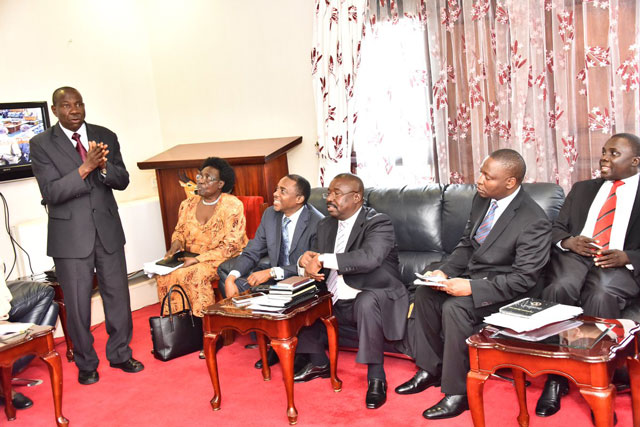
Kampala, Uganda | THE INDEPENDENT | The Parliamentary Committee on the National Economy has rejected the approval of a Sh736b domestic loan by the government for statutory payments, including salaries and wages.
Last month minister of state for finance in charge of planning, David Bahati tabled before parliament a notice of intention to move a motion for a resolution of parliament to borrow Shs736b domestically, to finance the financial year 20172018 budget deficits.
According to the notice signed by finance minister Matia Kasaija to parliament, the money is required to pay salaries and wages, security, Social Assistance Grants Empowerment (SAGE), energy and pensions and gratuity.
However last week, the committee chaired by former finance minister, also Nakaseke North MP Syda Bbumba, which was tasked by Speaker Rebecca Kadaga to examine the loan request, vowed not to approve the loan saying the justification for the loan was not satisfactory.
Unusual request
Finance minister Kasaija, and Bahati, appeared before the committee recently to defend the loan request, but the committee disregarded their explanation saying that acquiring the money locally, would have a great effect on the private sector.
“This request is rather unusual. It is domestic borrowing but we have been used to external borrowing. Domestic borrowing is not good for the private sector, banks will now prefer government and the private sector will be locked out,” Syda Bbumba, the committee chairperson said.
Legislators reminded Kasaija that in his 2017/2018 budget speech, he said government would reduce domestic borrowing from 2% of GDP to 1% of GDP in the short to medium term, to help the private sector access credit.
The legislators advised that the government considers investing funds acquired through loans into productive areas such as agriculture, instead of payment of salaries among other non-productive activities.
“This document doesn’t convince me at all to support this loan. Recently, Finance presented on the floor of parliament a supplementary budget. Why didn’t the Minister include these expenditure pressures there? I implore colleagues not to support this loan until we are satisfied that it is necessary,” Paul Akamba (Busiki county) said.
Suzan Ameru, the Amuria district woman MP, added; “I will not sign this loan request report. If we continue borrowing for salaries, we are finished, completely finished”.
The MPs faulted the government for failure to pay domestic arrears adding that acquiring more money locally would led to an increase in the domestic debt by the government.
Minister’s plea
Defending the loan request however, Kasaija told the MPs that the borrowing had been necessitated by revenue shortfalls as well as new expenditure pressures.
He also explained to the MPs that the money would not be requested for through a supplementary budget, adding that the government had already reached the 3% ceiling, as required by the Public Finance Management Act.
Kasaija pleaded with the MPs to approve the loan, saying its dismissal would affect crucial infrastructural projects by the Uganda National Roads Authority (UNRA) among other planned activities.
“Don’t dismiss this borrowing. We are ready to give you all the necessary information, because if I don’t pay for UNRA certificates, I will have to pay Shs60b in penalties, excluding interest. So I beg you…” Kasaija pleaded.
Apportioning the money
During the meeting, the ministers explained to the MPs that only Shs48b which they said is 1% of the loan request was required for salary payment whose beneficiaries, were recruited in the middle of the financial year.
They said that most of the money, for instance, the Shs280b was for UNRA infrastructure development projects. The ministers also explained that the other portion of the money would go towards procurement of food for prisoners, the army and the Uganda Police force. Economists argue that a move by the government to borrow from the domestic market, leads to a crowding out of the private sector.
****
SOURCE: CSBAG NEWSLETTER
 The Independent Uganda: You get the Truth we Pay the Price
The Independent Uganda: You get the Truth we Pay the Price



